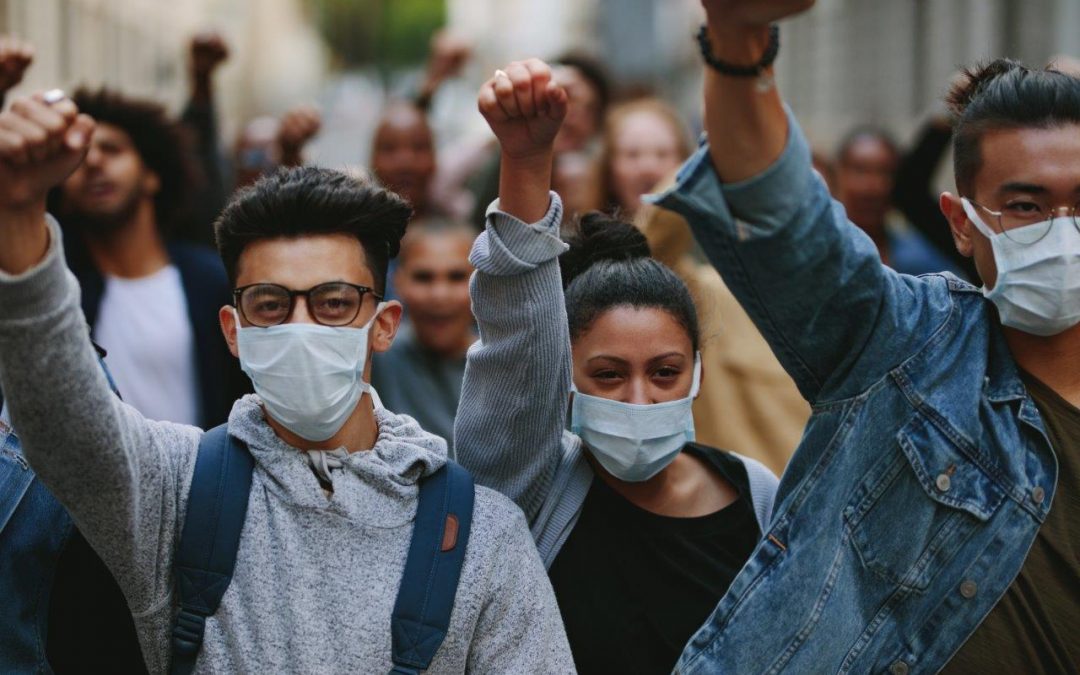How to Protect Ourselves From Fear and Anger in the Air
The new normal is full of new rituals to find relief. Removing a stiff pair of shoes after a long day at the office has been replaced with peeling off a mask after a weekly grocery run. Although most of us enjoy shedding our masks, they can offer a subtle emotional safeguard, a strange sense of anonymity and separateness.
Viral pathogens aren’t the only malady in the air. Many people are openly angry, rioting and yelling, some even publicly threatening the lives of others. It’s important to recognize that under most anger is a deep foundation of fear. To ensure we don’t inhale too much of the fear or the anger in the air, we need to find a dash of self-awareness and a hefty dose of compassion.
3 Tips for protecting yourself from anger :
- Pause before reacting
- Slow down your breath
- Focus on what unifies us as people
As a mindfulness teacher, stress reactions have always fascinated me. Many people may respond irrationally when threatened, especially if given a wall of protection. Consider road rage or unexpectedly hateful online posts. The shield of our vehicles or the virtual barrier of our social media pages becomes our safety net, allowing an audacity and disrespect that’s much less likely when face to face. This ruthlessness behind a shield is exacerbated when we’re afraid. Right now we’re terrified! For our health, our livelihoods, and our sense of control. Amidst this new uncertainty, even masks, while biologically protective, can add an extra layer of separateness.
Last week, while choosing mushrooms at the grocery store, I noticed a woman staring at me from several feet behind. She said nothing at first. Her face was masked like mine, but her eyes were enough to reveal her palpable rage. She began shouting at me angrily, “You crazy!” Before I could determine whether that was a question or a diagnosis, she got louder, mixing foreign and English words. The English was all expletives, mostly starting with f. I had no idea what I’d done to merit this woman’s outrage, as I was well beyond six feet from her. She then gestured toward a grocery cart, full of bananas, in front of me. I gently stepped aside, dumbfounded. She abruptly grabbed the cart and started shaking it, screaming harshly in her native tongue. Her words were hidden by her mask and her language, but her anger was conspicuous and sadly contagious. As she whisked away her cart, she left me with the burden of all her fury. I had now taken on her rage and my reflex was to rightfully carry it onward as my own.
Pause before Reacting
As I tried to make sense of what just transpired, her rage was now brewing within me. I noticed my heart pounding, ready to explode. My instinct was to use my adrenaline rush to chase down the banana hoarder, tackle her, and publicly declare my innocence and her wrongful attack on me. Fortunately, my mindfulness training had taught me to breathe first and react later. I took a moment to pause and reset.
Breathe
All I needed was time to find my breath, control it, and bring down my heart rate. It is near impossible to use the mind to control the mind. This is why saying “calm down” to a triggered person is so absurd and unnerving. Yet, we can use the body to control and reset our mind states. Exhale-oriented breath is the means for doing so. Extending exhales longer than inhales is the quickest way to bring the nervous system from “fight or flight” (survival) mode into “rest and digest” (thriving) mode. In my moment of being triggered in the grocery store, I instinctively began a practice I learned a decade ago in yoga, called three part breath. I followed my breath through three stages, my chest, ribs, and belly. There I stood in the organic produce aisle, eyes shut and hands on my torso, gently and loudly inhaling and then exhaling as long as I could. My favorite book on breath, Breathe To Succeed by Sandy Abrams, taught me to find my breath on command, anywhere and anytime I feel a stress trigger in my body. So I did, and with my breath, I slowly found my humanity.
Channel compassion, empathy, and gratitude
Before I took that pause, I was in the midst of an unraveling story in my head. I was an undeserving victim of an evil stranger’s outburst. Yet, after three minutes of slow breathing, I became a mere observer of my own narrative. I found perspective. I found compassion. I saw that this woman was scared, like me, and like many of us right now. Perhaps scared of getting infected by me and infecting someone she loves, someone for whom she’s baking banana bread, perhaps with chocolate chips.
I felt this stranger’s anguish, until she was no longer a stranger. She was a fellow human, just like me. A scared and similar human. I remembered what it was like to live in another country, and struggle with the language. I considered my life in Italy, before I’d learned Italian. Simple tasks like grocery shopping were truly intimidating with the language barrier. I, like her, had learned all the curse words first. I giggled to myself, noticing how predictable we humans are. We can get so deeply buried in our own stories, we fail to notice our behavior and how it may affect others. We are all others sometimes.
I wasn’t angry or scared anymore. I no longer felt wronged. I didn’t need to defend myself. And so, in that moment, I liked me. I was grateful for my pause, my breath, and for finding the space for kindness. I saw the kindness in me. I was grateful for my delayed reaction. I was grateful also for the food I was going to buy for my family and me. I was even grateful for this woman. She reminded me of my own connection to others. We all have similar instincts when threatened. The absurdity of being triggered humans.
We are all in this together. The fear and anger in the air doesn’t have to infect us. When we control our breath, we expand our reaction time. In that expanded space, we can repel the hate, and be our highest, kindest, greatest selves. The selves that we ourselves can like. We can wear our masks to separate us from pathogens, but not from human connection. We humans are interconnected, and we thrive when we feel that connection.


